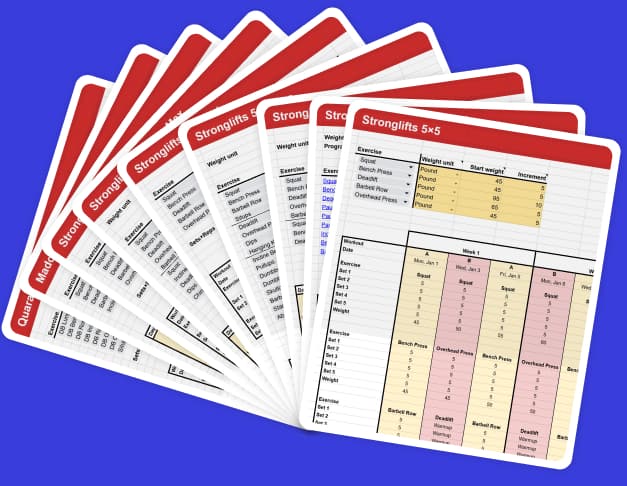Stronglifts 5×5 is the simplest and most effective workout program for new or returning lifters who want to get stronger and build muscle fast.
If you’re looking for a simple workout program that just works, and you don’t want to spend hours in the gym, then you’re going to love the Stronglifts 5×5 workout program.
Let me show you how Stronglifts 5×5 works.
Contents
Join the Stronglifts community to get free access to all the spreadsheets for every Stronglifts program. You’ll also get daily email tips to stay motivated. Enter your email below to sign up today for free.
What is the 5×5 workout?
The 5×5 workout is a strength and muscle building program that’s been around for more than 65 years. It consists of compound barbell exercises like the Squat, Bench Press and Barbell Row for 5 sets of 5 reps (5×5).
You do three workouts a week, with at least one rest day in between. Your goal is to increase the weight on the bar over time. The 5×5 workout has been popular for decades because it’s simple, time-efficient, and very effective for building strength and muscle mass as a drug-free lifter.
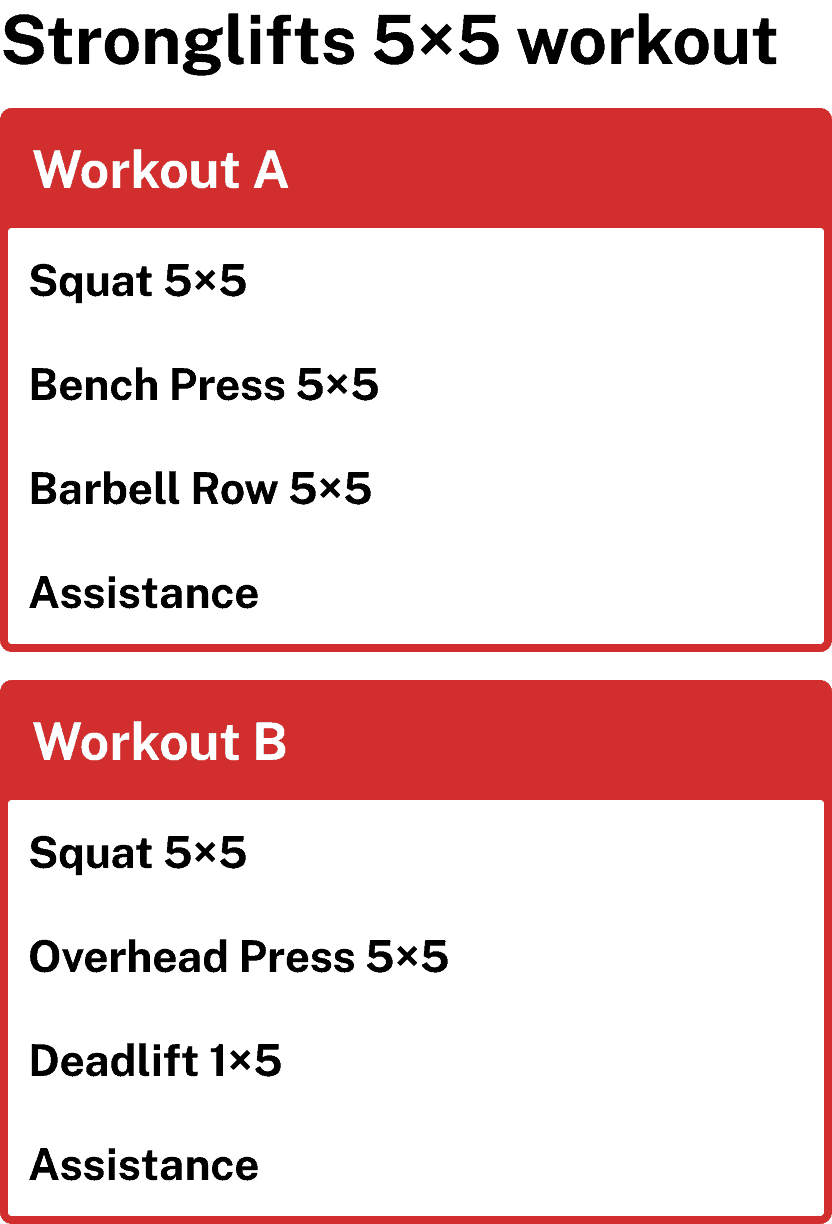
It’s not clear who invented the 5×5 workout. The first person to write about in the 1958 was Arnold Schwarzenegger’s mentor, Reg Park. I discovered the 5×5 workout in 2003 and it revolutionized my training. In 2007 I created the biggest guide on the entire Internet about the 5×5 workout. This became known as “Stronglifts 5×5”.
Quick start guide
The Stronglifts 5×5 program consists of two workouts…
| Stronglifts 5×5 | |
|---|---|
| Workout A | Workout B |
| Squat 5×5 | Squat 5×5 |
| Bench Press 5×5 | Overhead Press 5×5 |
| Barbell Row 5×5 | Deadlift 1×5 |
| Assistance Work | Assistance Work |
Here’s how it works:
- Aim for three workouts per week
- Take at least one day off between workouts
- Alternate workouts A and B each time you lift
Most Stronglifters train Monday, Wednesday and Friday. This gives you one rest day between workouts and weekends off to recover.
Here’s how your first month of Stronglifts 5×5 looks like…
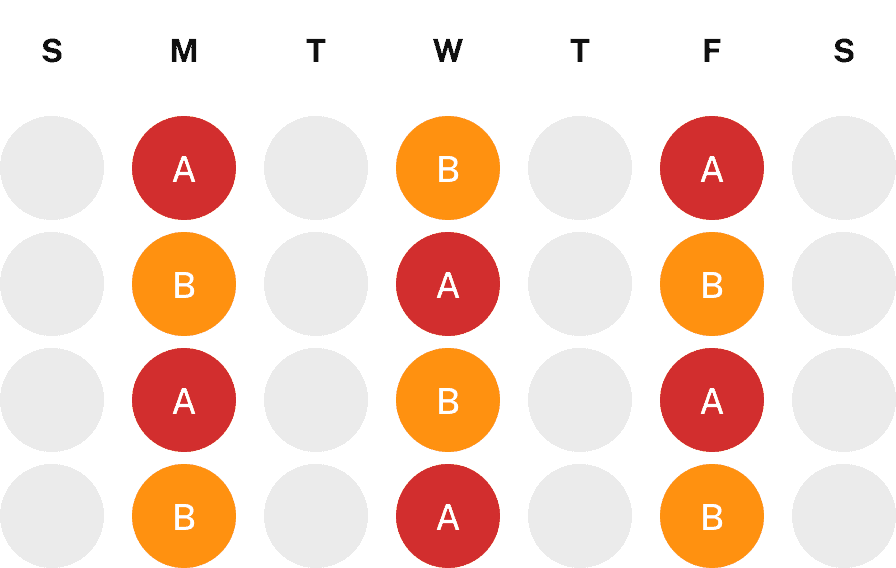
The Stronglifts app automatically alternates workouts A and B like this for you. It remembers which workout you did last time. You can focus 100% on lifting while we plan your 5×5 workouts for you.
5×5 means five sets of five reps with the same weight. Squat 5×5 225lb means you Squat 225lb for five reps, rest about 3min and then Squat your second set of five reps with 225lb. Repeat until you’ve done five sets.
Like this…

Once you’ve completed five sets of five reps on the Squat in workout A, move to the Bench Press. Do five sets of five on this exercise too. Then move to the Barbell Row and do 5×5. After that you’re done!
Like this…
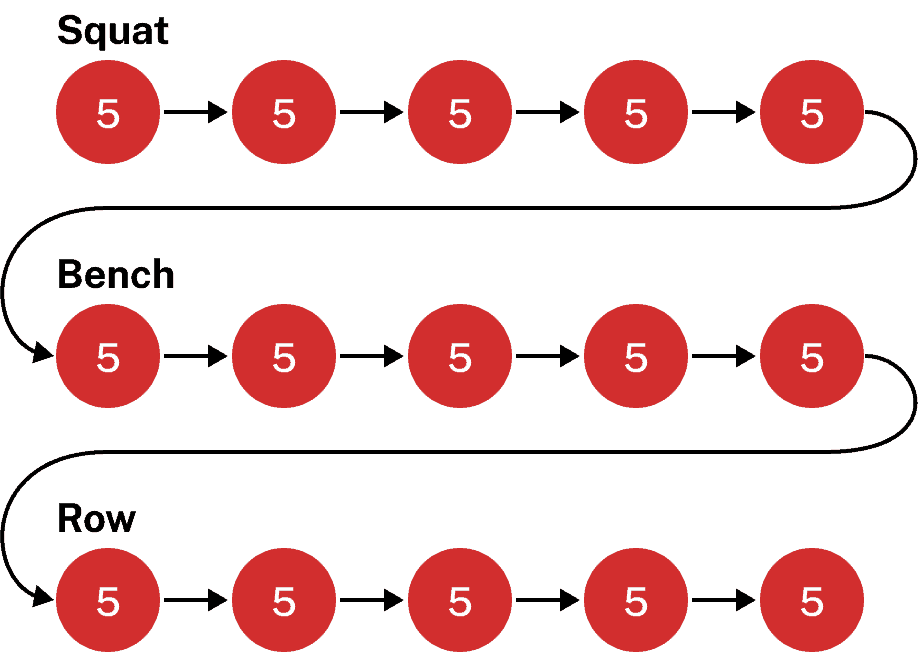
Pick easy starting weights.
- If you’ve never lifted before, start with the empty bar on the Squat, Bench and OHPress. Start with 65-95lb or 30-40kg on Rows and Deadlifts. This includes the bar weight (45lb or 20kg).
- If you’ve lifted weights before, do your first 5×5 workouts with a weight that you could lift for 10 reps. Say you can Bench Press 200lb for 10 reps. Start with 200lb for 5×5.
Starting light decreases the risk of getting hurt, reduces soreness and gives you room to progress. You can better focus on proper form when the weight is light. To get your starting weights calculated for you, enter your stats and experience level in the Stronglifts app.
The goal with Stronglifts 5×5 is progressive overload. Pushing yourself to do more work over time stimulates your body to build strength and muscle. The simplest way to push yourself is to add weight on the bar.
Say you did 5×5 135lb on the Squat last workout. Add 5lb next time. Do 5×5 140lb by adding a plate of 2.5lb on each side of the bar. Here’s how your Squat then progresses each workout…
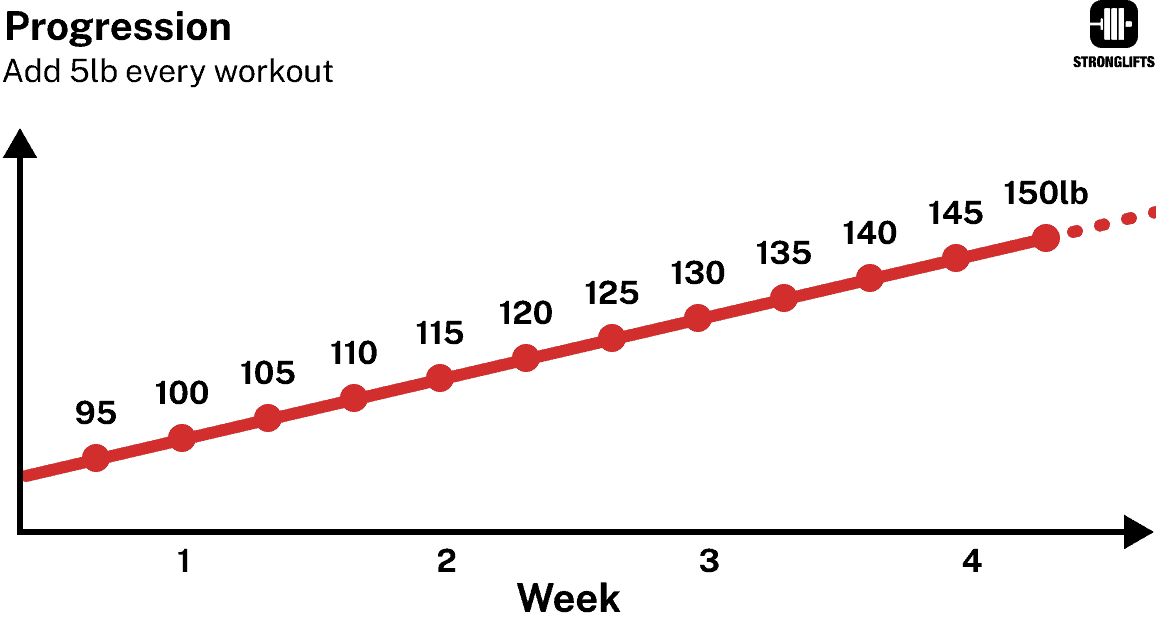
You don’t have to add 5lb every workout. You can add half that (2.5lb). You can also add weight every two or three workouts. The point is to challenge yourself by trying to do more over time. You should not be lifting the same weight week after week for a year.
The Stronglifts app automatically adds weight for you if you completed your sets. You can control how often and how much weight to add.
Workout schedule
The American College of Sports Medicine recommends adults new to lifting 2 to 3 full body workouts per week (1). You don’t have to lift weights 5-6x/week to get stronger and build muscle.
Most Stronglifters workout Monday, Wednesday and Friday. Here’s why:
- You get at least one day off between workouts. You can use this for passive recovery (doing nothing) or active recovery (light to moderate intensity cardio or assistance work).
- Most people work Monday to Friday. The new gym routine goes on top of your existing work routine. You lift before or after work or during your lunch break. Many Stronglifters find that this helps them to be more consistent with their workouts.
- Weekends are off work and gym.
Many other workout schedules are possible. You can train on Tuesday, Thursday and Saturday, or Sunday, Tuesday and Thursday. Compare…
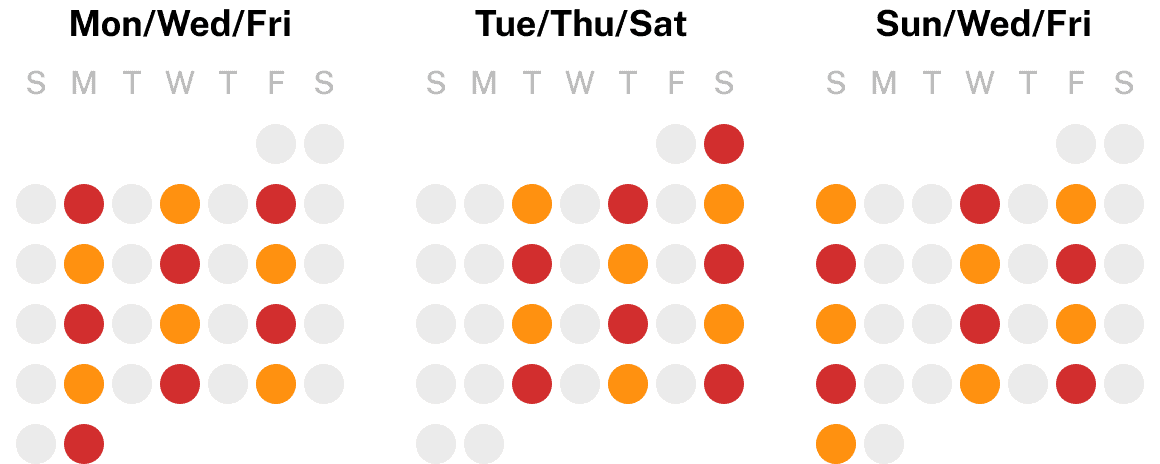
If you don’t have time to train 3x/week, you can do two Stronglifts 5×5 workouts per week. New lifters who train 2x/week get about 80% of the strength gains compared to 3x/week (2).
Here’s how the 2x/week Stronglifts 5×5 workout schedule looks like…
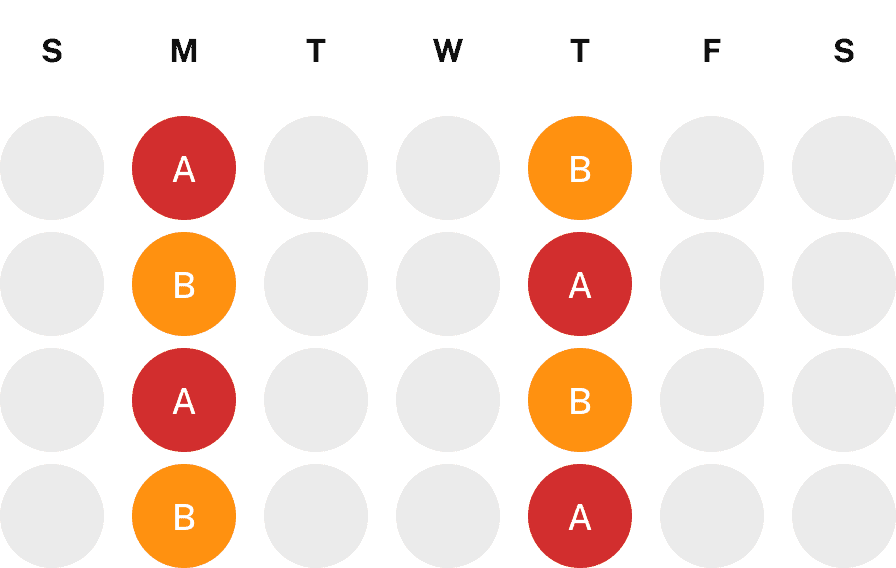
The best workout schedule is the one you can stick to. As long as you take at least one day off between two workouts, it’s fine.
You can set your workout schedule in the Stronglifts app – program – workouts – schedule. Your workouts will be planned on the days you pick.
Exercises
On Stronglifts 5×5 you do three types of exercises – Push, Pull and Leg.
| Push | Pull | Leg |
|---|---|---|
| Bench Press | Deadlift | Squat |
| Overhead Press | Barbell Row | Deadlift |
Here’s what this means:
- Bench and Overhead Press are push exercises. You push the weight away from your body until your arms are locked. You train pushing something away or lifting it overhead.
- Deadlifts and Barbell Rows are pull exercises. You pull the weight from the floor towards your body. You train pulling something heavy towards you, or lifting it off the floor.
- Squats (and Deadlifts) are leg exercises. You lift the weight with your legs until you stand with the weight. You train sitting down and coming back up without using your hands.
Free weights make it possible to do dozens of exercises with just one bar, bench and Power Rack. You don’t need several bulky and expensive machines like the leg press and chest press. Free weights make it easy to build a home gym in your garage, basement or backyard shed. If you train in a gym, you’ll find that the free weight area is often less busy.
Training at home can increase exercise adherence if you lack time or have irregular work hours. It’s easier to fit your workout in if you have a 24/7 open home gym. You save time commuting to the gym or waiting for equipment to be free. You also save money on gym fees. Training at home doesn’t mean alone. Many Stronglifters train with their family members. I trained with my brothers for years or had friends come over.
The problem with free weight exercises is that they’re more complex to learn. You need to learn to balance and control the bar. It’s like learning to ride a bicycle: it takes practice. But once you know how to lift, you’ve acquired a skill for life. The best time to start learning is now.
You don’t need a coach to learn how to do free weight exercises with proper form. You just need to put in time and effort. Start light and work your way up gradually. Even if your form isn’t “perfect”, it’s almost impossible to hurt yourself if you start with light weights.
The Stronglifts app will automatically rotate the exercises for you. It will alternate workouts A and B each time. It will also calculate your starting weights for you and gradually increase the weight.
Muscles worked
Stronglifts 5×5 is a full body workout program.
- Each workout works your upper and lower body
- Each workout consists of a push, pull and leg exercise
- Each workout uses compound exercises that work several muscles at the same time
Here are the major muscle groups you work with Stronglifts 5×5…
| Muscle | Exercise |
|---|---|
| Chest | Bench |
| Shoulders | Bench, Overhead Press |
| Back | Row, Deadlift, Squat |
| Triceps | Bench, Overhead Press |
| Biceps | Row, Squat |
| Legs | Squat, Deadlift |
| Calves | Squat |
Over the course of a week, you work all your major muscle groups with Stronglifts 5×5. There are no isolation exercises but you can build muscle by doing only compound lifts. A study by Paoli et al found no difference in muscle gains between groups doing only compounds vs only isolation (3).
The Stronglifts 5×5 workouts are short and easy to stick to because you only do three exercises. If you have time or energy to do more, you can easily add cardio or assistance work for arms/abs.
Exercise order
This is the exercise order for each Stronglifts 5×5 workout…
- Legs – Squat
- Push – Bench or Overhead Press
- Pull – Barbell Row or Deadlift
Example for workout A:

Here’s the reason for this exercise order:
- Squats are the hardest exercise. They’re technically challenging, physically hard and mentally tough. That’s why we do them first.
- After Squats your legs and back are tired. Give them a break by doing a push exercise for your upper body. That’s Bench Press in workout A and Overhead Press in workout B.
- Finish your workout with Barbell Rows or Deadlifts. These work your lower back and legs again.
If the Squat rack is taken, ask how many sets they have left. It’s not rude to ask. They often only have a set or two left. If they just started, ask to train inbetween. This too is not rude as long as you help (un)loading the bar. It’s a great way to make friends at the gym.
5×5 = 5 sets of 5 reps
5×5 means you do five sets of five reps with the same weight. These are “straight sets” or “sets across”. On the Squat, Bench Press, Overhead Press and Barbell Row you do 5×5.
Say you Squat 5×5 225lb (total weight including the bar, because you lift it). Your worksets look like this…

Here’s how that works:
- Squat 225lb for 5 reps.
- Rack the weight. Rest ~3min.
- Squat your second set of 5 reps with 225lb. Rest ~3min.
- Repeat until you’ve done 5 sets of 5 reps with 225lb.
- After that move to the Bench Press in workout A
Like this…

Before starting the 5×5 worksets, you should warm up by doing several lighter sets. I’ll show you how to do that below.
Here 225lb means the 45lb bar and 90lb per side. That’s two plates of 45lb on both ends of the bar.
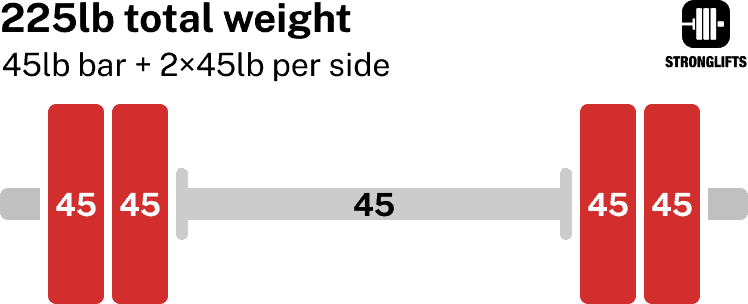
The plate math can be tricky when you start lifting. It’s easy to put the wrong weight on the bar. This can result in failed reps or tweaking something. That’s why we’ve built a plate calculator inside the Stronglifts app. Tap the weight to see which plates to add. We do the math so you can focus on lifting.
Deadlift is 1×5
You don’t do 5×5 on Deadlifts.
You do 1×5 – one heavy set of 5 reps after you warm up. Say you Deadlift 5x300lb (including the bar weight). Your Deadlift session looks like this…
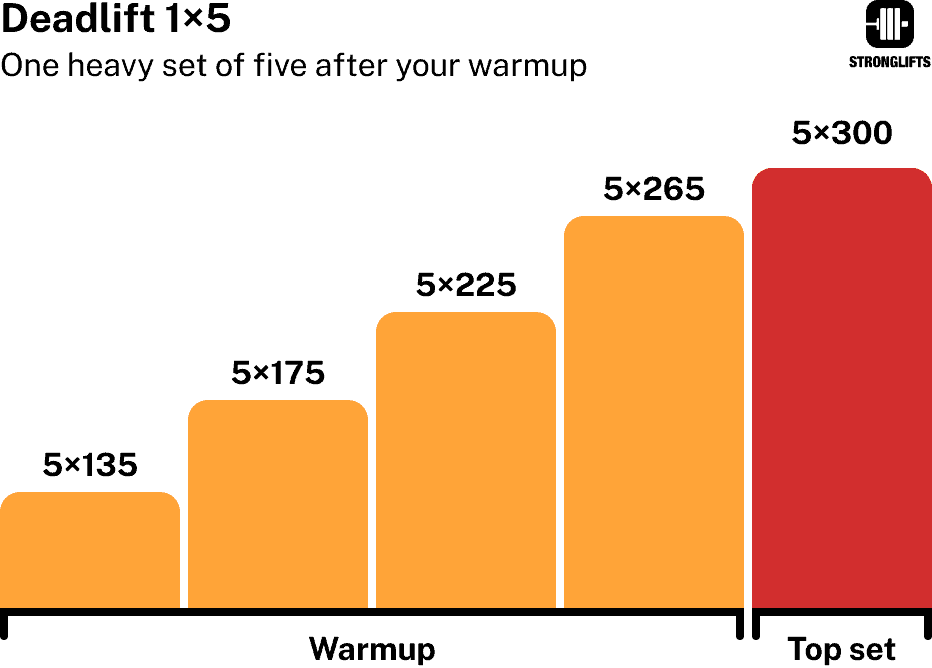
Here’s how this works:
- Warm up by Deadlifting 135lb for five reps
- Add weight to do progressively heavier warm up sets
- Finish with one heavy Deadlift set of five reps
To keep your workout short, don’t rest between warm up sets. Add weight on the bar and do your next set. Rest after the last warm up set only. Rest about 3min before Deadlifting your heaviest set.
Like this…

Isn’t that 5×5 Deadlifts?
Yes and no. You did five sets of five. But they weren’t straight sets. You didn’t use the same weight on each set. You did gradually heavier sets of five reps. These are ramp sets. You’ll do them a lot on Madcow 5×5 later. Ramp sets are easier to stomach at the end of a workout in which you already did heavy Squats and Overhead Press for 5×5.
I’ll show you how to warm up below. But if you use the Stronglifts app, it will automatically calculate your Deadlift warm up sets for you. Just tap the warm up tab in the workout screen.
Starting weights
Start Stronglifts 5×5 with easy weights.
Starting light reduces the risk of getting hurt as a new lifter. It makes it easier to focus on proper form. It decreases soreness that can make you want to skip the next workout. It gives you room to progress.
The right starting weight depends on your strength, size and experience. Here’s how much Stronglifters usually start with…
| Exercise | New lifter | Some experience |
|---|---|---|
| Squat | 45-95lb | 95-135lb |
| Bench Press | 45-95lb | 95-135lb |
| Deadlift | 95-135lb | 135-185lb |
| Overhead Press | 45-65lb | 65-95lb |
| Barbell Row | 65-95lb | 95-135lb |
Starting weights in kilogram…
| Exercise | New lifter | Some experience |
|---|---|---|
| Squat | 20-40kg | 40-60kg |
| Bench Press | 20-40kg | 40-60kg |
| Deadlift | 40-60kg | 60-80kg |
| Overhead Press | 20-30kg | 30-40kg |
| Barbell Row | 30-40kg | 40-60kg |
Say you’ve never lifted weights. Here’s how much weight to use in your first Stronglifts 5×5 workouts…
- Start with the empty bar on the Squat, Bench and Overhead Press. The empty Olympic bar weighs 45lb/20kg. If this is too easy, then put some weight on each side of the bar.
- Start with 95lb/40kg on Deadlifts (including bar weight) and 65lb/30kg on Barbell Rows. This way you can rest the weight on the floor between reps, and setup with proper form.
- If the empty bar is too heavy, use a lighter bar. You can also use two dumbbells for Bench/OHP until you get stronger.
If you’ve lifted before, start with a weight that you could lift for 10 reps. Lift it for 5×5 in your first Stronglifts 5×5 workouts. Say you can Bench 135lb for 10 reps. Start with 135lb for 5×5. Then add 5lb each workout. The program will start easy but become progressively harder.
If the first workout is too easy, you can add more weight next workout. Progress by adding 10lb for a while. Or just wait for the program to become harder. The weight will increase by 60lb/month on the Squat and Deadlift, and 30lb on the Bench, OHP and Row. Things will get hard soon enough. Focus on your form while the weight on the bar increases.
If you struggle to complete your sets in the first workout, you started too heavy. If your legs are so sore the next day that you feel like skipping your next workout, you started too heavy. If lifting the empty bar made you really sore, you’re a little out of shape and can expect fast progress.
Enter your stats and lifting experience in the Stronglifts app. We’ll calculate your starting weights for you.
Rest between sets
Rest about 3min between your five sets of five reps.
| How hard was the last set? | Rest period |
|---|---|
| Easy | 1-2min |
| Normal | 3min |
| Hard | 5min |
Here’s what this means:
- Rest 1-2min after easy sets like warm ups.
- Rest 3min after the majority of your 5×5 work sets.
- Rest 5min after hard sets where you struggled to do 5 reps
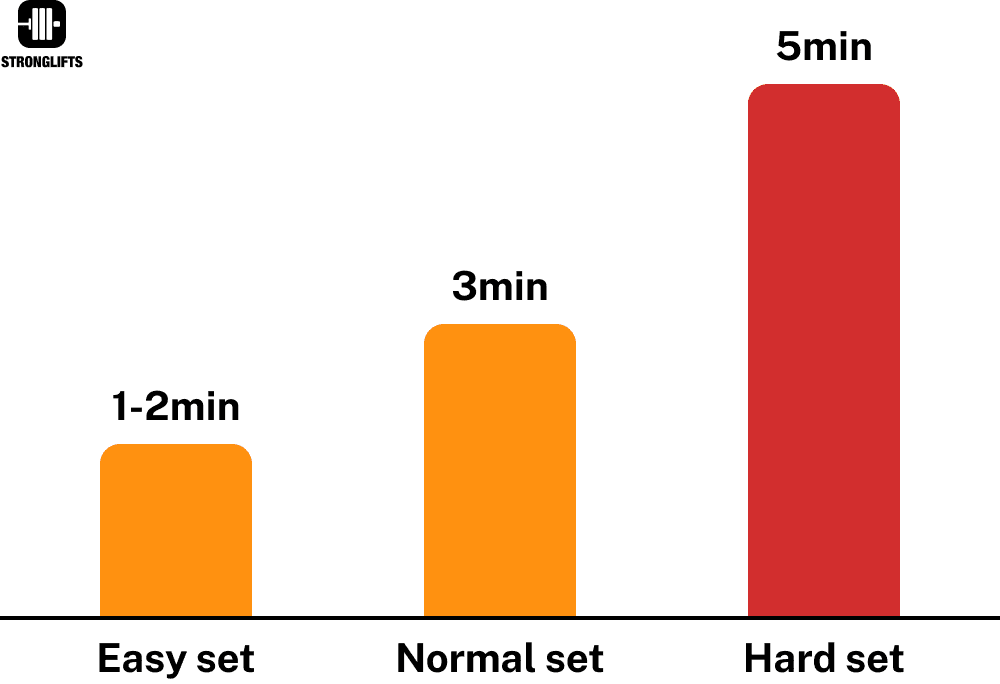
Short rest periods are fine the first weeks of Stronglifts 5×5. If you start with easy weights, you won’t need more than 1-2min rest between sets. Shorter rest periods are also fine between warm up sets.
Once the weights get heavier and more challenging to lift, you’ll need 3min rest between worksets. Longer rest periods help you achieve more reps after hard sets (4, 5). Resting 5min after the hardest sets decreases the chance of missing reps on the next set. This will increase your workout duration but we’ll address that later by switching to top/back-off sets.
The Stronglifts app has an automatic rest-timer. Simply log your set by tapping the circles. The timer starts and notifies you when it’s time for your next set. The rest timer is dynamic – it will tell you to rest longer after failed sets. It even works with Apple Watch.
Lifting tempo
Lift the weight under control but not slow.
- Don’t lift the weight super slow, you’ll make it harder to lift.
- Don’t lift the weight super fast, you’ll make it harder to control.
- Don’t rush your reps, focus on doing them with good form.
If you’re new to lifting, you can move the weight slower during the first weeks of Stronglifts 5×5. This makes it easier to focus on proper form. Once you’ve mastered the basics, you can lift the weight faster. This helps strength gains (6). Way down should be controlled but not slow.
You can rest 1-2 seconds between reps. This gives you time to focus on your next rep and take a breath. Rest after the bar has returned to the starting position. That means…
- Rest at the top of the Squat and Bench Press
- Rest when the bar is on your shoulders on Overhead Press
- Rest when the bar is on the floor on Deadlifts and Barbell Rows
If you rest at the bottom of the Squat or Bench, you’ll kill the stretch reflex. This makes the next rep harder to lift.
How to warm up
Warm up with a light weight like the empty bar. Then do progressively heavier sets until you reach your work weight (the 5×5 sets).
Say you have to Squat 200lb for 5×5. Here’s how you’d warmup…
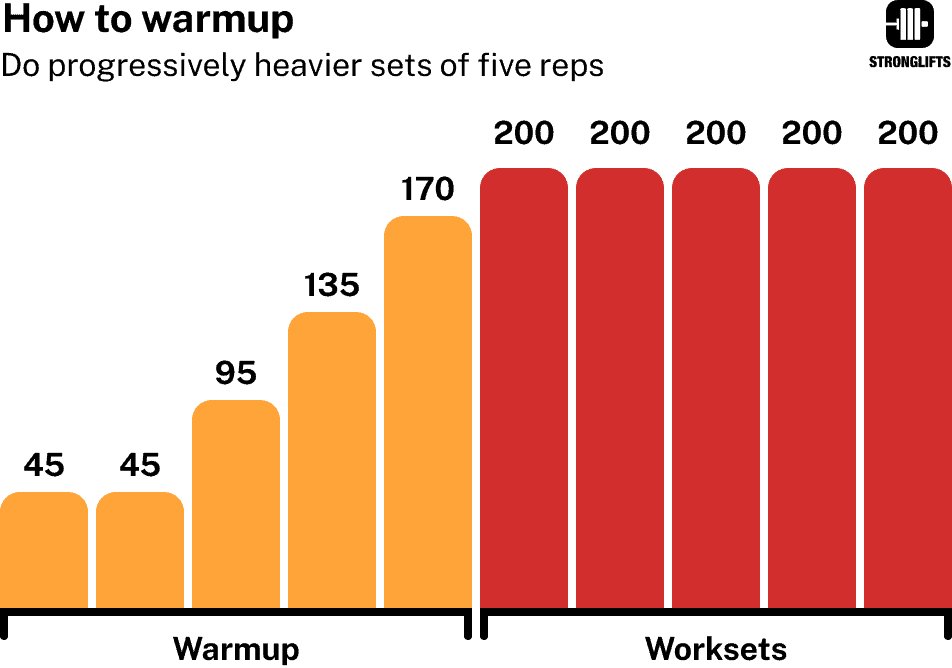
Don’t go to the gym, load the bar with 200lb and Squat it for 5×5. Start with two sets of five reps with the empty bar. Then do several heavier warm up sets of five reps until you reach your work weight.
Like this…

This warm up will take about 5min. Executing each set takes about 30sec. There’s no rest between warmup sets – the weight is light. Add weight and do your next set. Your body temperature will increase faster if you keep moving. And you keep your workouts short.
Here are the benefits of this warm up…
- You warm up your muscles and lubricate your joints
- You loosen up your body (Squats stretch your hips)
- You practice proper form before it gets heavy
- You prepare mentally for the heavy work sets
- You’re less likely to get hurt (7)
On the Squat, Bench and OHPress, start with the empty bar. On Deadlifts and Barbell Rows, start with 65-135lb so the weight can rest on the floor. Then add 25-45lb/10-20kg per set until you reach your work weight.
The Stronglifts app has a built-in warm up calculator that gives you the exact sets, reps and weights to warm up with. It’s one of the most used features. I recommend to follow what it says. This prevents being underprepared from doing too little, or fatigued from doing too many warmup sets.
How to progress
Add weight if you completed five reps on all sets of this exercise.
If you didn’t complete five reps on all sets, then don’t add weight next time. You couldn’t lift this weight for 5×5. You probably can’t lift more weight for 5×5. Repeat this weight until you can lift it for 5×5.
Here’s a flow chart of when to add weight…
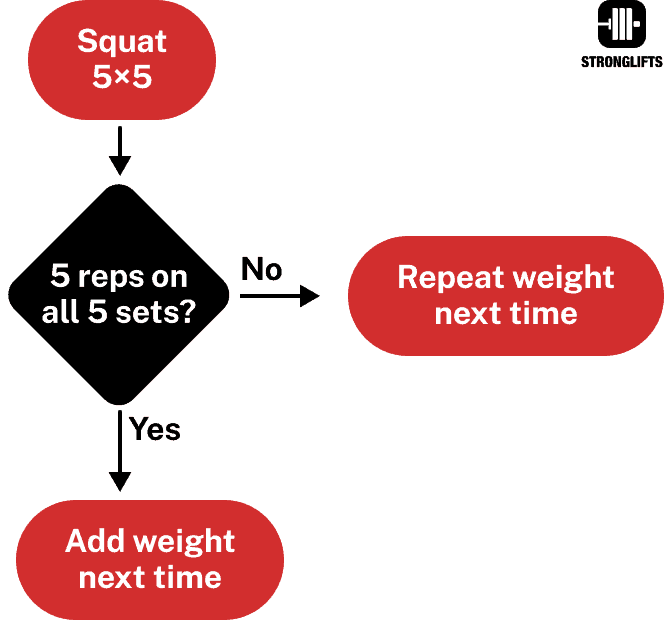
What if you completed 5×5 on Squats but not on Overhead Press? Add weight on Squats but not on Overhead Press.
Like this…
| Exercise | Last workout | Next workout |
|---|---|---|
| Squat | 5×5 200lb | 5×5 205lb (+5lb) |
| Overhead Press | 5/5/5/3/3 105lb | 5×5 105b (repeat) |
| Deadlift | 5×235lb | 5×240lb (+5lb) |
Here’s how this works:
- Squats you did 5×5 200lb. You completed five reps on all five sets. Add 5lb and do 5×5 205lb next time.
- Deadlift you did 5x235lb. You also completed five reps on your top set of five. Add 5lb and do 5x240lb next time.
- Overhead Press you didn’t do 105lb for 5×5. You did 5/5/5/3/3. That’s 3 sets of 5 and 2 sets of 3 reps. Repeat the weight and try to do more reps than last time. Aim for 5×5 with 105lb.
Don’t hold back on your Squat and Deadlift if you didn’t complete 5×5 on the Overhead Press. You will not lift the same weight on all exercises. Squat and Deadlift work bigger and larger muscles. They will progress faster than Bench, Overhead Press and Barbell Row.
This is the progress you should expect…
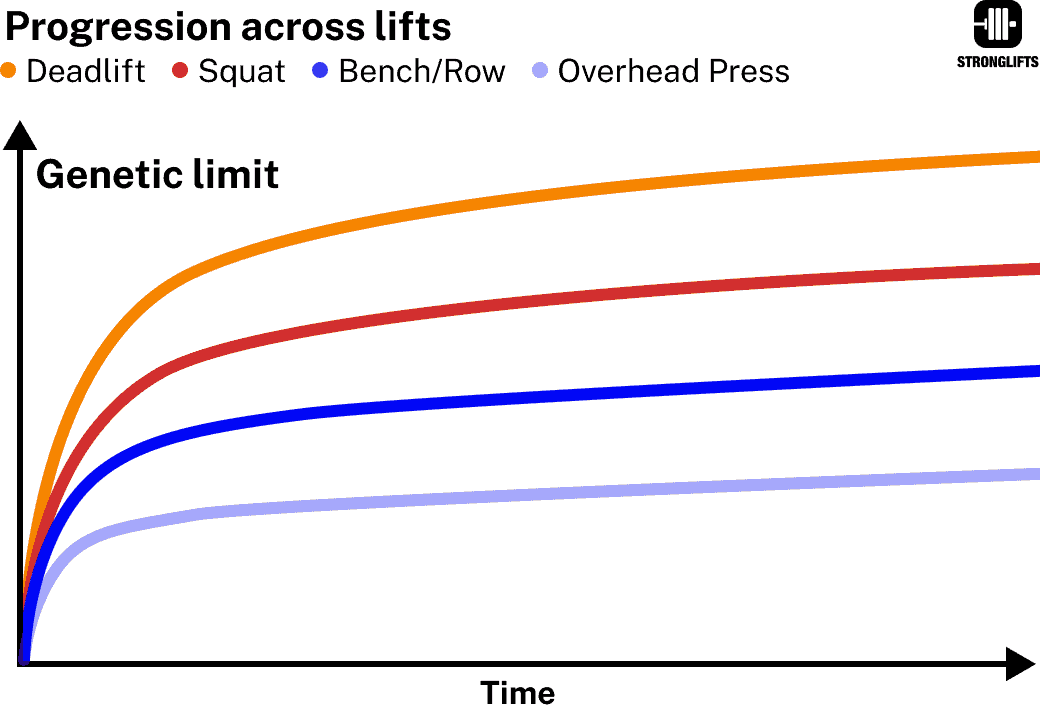
The Stronglifts app automatically adjusts the weights for you. It adds weight on the exercises you did 5×5. Otherwise it repeats it. You can focus 100% on lifting while the app does the thinking.
Read: how to progress on Stronglifts 5×5
How much weight to add
Progress by adding 5lb on the bar. That’s one plate of 2.5lb per side.
The right increment depends on the exercise you do. Compare…
| Exercise | Increment | |
|---|---|---|
| Big muscles | Squat, Deadlift | 5-10lb / 2.5-5kg |
| Small muscles | Bench, OHPress, Row | 2.5-5lb / 1.25-2.5kg |
Here’s the difference:
- Squat and Deadlift work big muscles like the legs and back. They can lift more weight and handle bigger increments.
- Bench, OHPress and Row work small muscles like the chest, shoulders and arms. Small muscles lift less weight. They progress better if you use smaller increments.
Start by adding 5lb on the Squat, Bench, OHP and Row. Men can usually add 10lb on Deadlifts for a few weeks. After that 5lb increments will work better. 10lb increments on Squats is not a good idea because you Squat 3x/week. Progress would be too fast.
Once your progress slows, use smaller increments of 2.5lb (1.25/side). Many women find they need to do this from day one. Women have less muscle than men, particularly in the upper body (8, 9). The smaller you are, the less weight you lift, the better smaller increments work.
What if your gym doesn’t have small plates? Ask the staff. Sometimes they hide them because small plates are easy to steal.
If your gym has no small plates, buy a pair and put it in your gym bag. They’re cheap and don’t take much space. You can also buy two small chains at the DIY shop and put that on the bar. Or get a pair of washers or ankle weights or magnet weights.
If you enter your gender, weight and strength level in the Stronglifts app, you’ll get the right increments set for you. We’ll even adjust your increments as you get stronger so you progress better.
Read: how to overcome failure on Stronglifts 5×5
When to add weight
Start by adding weight every Stronglifts 5×5 workout.
Like this…

Here’s how this works:
- You Squatted 175lb for 5×5.
- Next workout add 5lb. Squat 180lb for 5×5.
- If you did 180lb for 5×5, add 5lb again the workout after. Squat 185lb for 5×5.
Say you train Monday, Wednesday and Friday. Here’s how your Squat will progress when you add weight every workout…
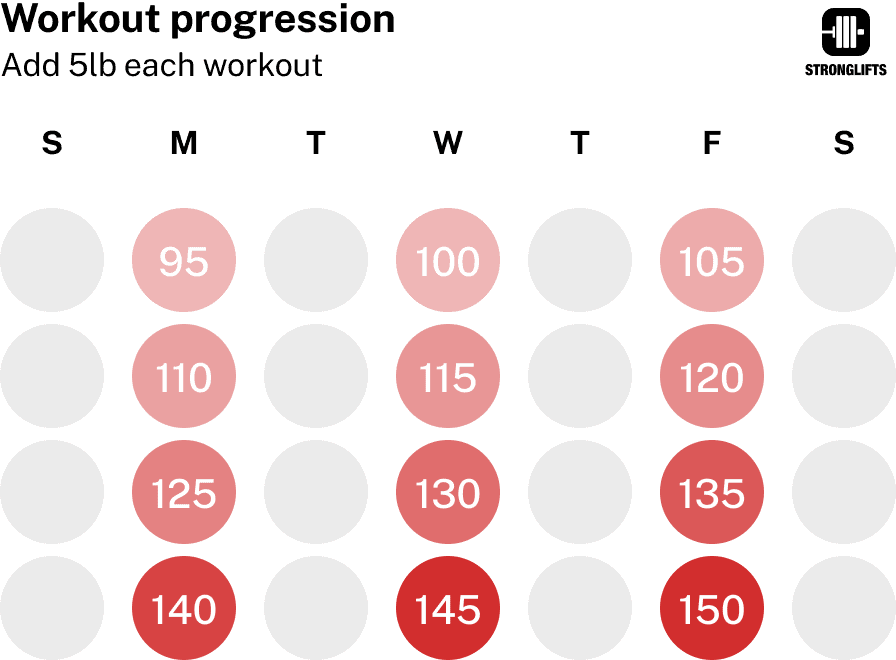
The Stronglifts app automatically increases the weight for you like this. It remembers how much weight you lifted in your last 5×5 workout. It then adds weight next workout. You can focus 100% on lifting.
Read: how to break plateaus on Stronglifts 5×5
Stronglifts 5×5 Spreadsheet
Download the free spreadsheet for Stronglifts 5×5.
You’ll get a big picture overview of how the program works, how the weights progress, and how the workouts alternate. You can substitute exercises easily, and calculate your starting weights. The spreadsheet is completely free.
After that, use the Stronglifts app to log your workouts in the gym. It’s easier to use than the spreadsheet and comes with many features to save you time in the gym: a built-in rest timer, warmup calculator, plate calculator, etc. With the Stronglifts app you can fully focus on lifting while we do all the thinking.
Join the Stronglifts community to get free access to all the spreadsheets for every Stronglifts program. You’ll also get daily email tips to stay motivated. Enter your email below to sign up today for free.
References
1. American College of Sports Medicine. “American College of Sports Medicine position stand. Progression models in resistance training for healthy adults.” Medicine and science in sports and exercise vol. 41,3 (2009): 687-708. doi:10.1249/MSS.0b013e3181915670
2. Braith, R W et al. “Comparison of 2 vs 3 days/week of variable resistance training during 10- and 18-week programs.” International journal of sports medicine vol. 10,6 (1989): 450-4. doi:10.1055/s-2007-1024942
3. Paoli, Antonio et al. “Resistance Training with Single vs. Multi-joint Exercises at Equal Total Load Volume: Effects on Body Composition, Cardiorespiratory Fitness, and Muscle Strength.” Frontiers in physiology vol. 8 1105. 22 Dec. 2017, doi:10.3389/fphys.2017.01105
4. Miranda, Humberto et al. “Effect of two different rest period lengths on the number of repetitions performed during resistance training.” Journal of strength and conditioning research vol. 21,4 (2007): 1032-6. doi:10.1519/R-21026.1
5. Willardson, Jeffrey M, and Lee N Burkett. “A comparison of 3 different rest intervals on the exercise volume completed during a workout.” Journal of strength and conditioning research vol. 19,1 (2005): 23-6. doi:10.1519/R-13853.1
6. Wilk, Michal et al. “The Influence of Movement Tempo During Resistance Training on Muscular Strength and Hypertrophy Responses: A Review.” Sports medicine (Auckland, N.Z.) vol. 51,8 (2021): 1629-1650. doi:10.1007/s40279-021-01465-2
7. Ding, Liyi et al. “Effectiveness of Warm-Up Intervention Programs to Prevent Sports Injuries among Children and Adolescents: A Systematic Review and Meta-Analysis.” International journal of environmental research and public health vol. 19,10 6336. 23 May. 2022, doi:10.3390/ijerph19106336
8. Janssen, I et al. “Skeletal muscle mass and distribution in 468 men and women aged 18-88 yr.” Journal of applied physiology (Bethesda, Md. : 1985) vol. 89,1 (2000): 81-8. doi:10.1152/jappl.2000.89.1.81
9. Miller, A E et al. “Gender differences in strength and muscle fiber characteristics.” European journal of applied physiology and occupational physiology vol. 66,3 (1993): 254-62. doi:10.1007/BF00235103




